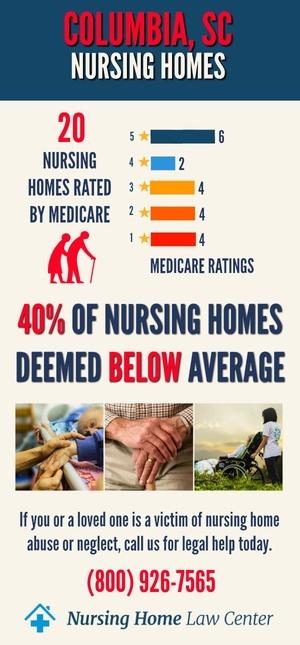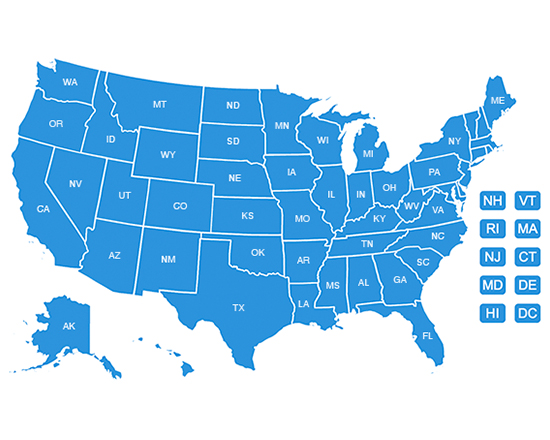The Nursing Home Law Center is committed to providing the legal resources necessary to hold negligent facilities accountable.
Columbia, SC Nursing Home Abuse Lawyer

Licensed in South Carolina
Nursing home abuse is a heartbreaking and often hidden issue that affects some of the most vulnerable members of our society. It is essential for victims and their families to seek legal assistance from an experienced Columbia nursing home abuse lawyer.
Nursing home neglect lawyers play a vital role in protecting the rights of nursing home residents, holding abusive staff or negligent facilities accountable, and securing financial compensation for the harm caused.
Why Hire Nursing Home Law Center
At Nursing Home Law Center, we are dedicated to obtaining justice and fair compensation for those affected by nursing home abuse. Our experienced legal team has a long history of successfully handling elder abuse cases with care, consistently achieving substantial settlements and favorable verdicts for our clients.
We conduct comprehensive investigations to uncover all aspects of the abuse, ensuring everything from medical costs to emotional trauma and other damages is addressed. With our extensive knowledge of nursing home abuse claims, we manage every detail of your case and work relentlessly to defend your rights.
Types of Cases Handled by Our Columbia Nursing Home Abuse Lawyers

Nursing home abuse refers to any action or failure to act that causes harm, injury, or suffering to a nursing facility resident. This abuse can take many forms, impacting the physical, emotional, and financial well-being of victims.
At Nursing Home Law Center, our Columbia nursing home neglect lawyers are experienced in handling various types of elder abuse cases, ensuring that victims and their families receive justice and fair compensation.
Physical Abuse
Physical abuse involves the intentional infliction of pain or injury on a resident. This can include hitting, slapping, or pushing, as well as improper use of restraints.
Mental and Emotional Abuse
Mental and emotional abuse includes verbal insults, threats, humiliation, or intentionally isolating a resident from other residents and family members.
Sexual Abuse
Sexual abuse in nursing homes is a serious violation of a resident’s dignity and safety, which involves any form of unwanted sexual contact.
Medical Malpractice
Medical malpractice in nursing homes occurs when medical staff fails to provide appropriate care. This can include medication errors, failure to prevent or treat bedsores (pressure ulcers), and improper treatment of illnesses or injuries.
Negligence
Nursing home neglect occurs when nursing home staff fail to meet the basic needs of residents. This can involve poor hygiene, malnutrition, dehydration, or allowing a resident to wander unsupervised (elopement).
Financial Abuse
Financial exploitation occurs when a resident’s finances are misused or stolen by a staff member or other individuals within the facility. This can include unauthorized withdrawals, forged signatures, or manipulation to change wills or financial documents.
Wrongful Death
In the most tragic cases, nursing home negligence or elder abuse can result in the death of a resident. Whether caused by abuse, neglect, or medical malpractice, wrongful death claims hold the responsible parties accountable for the loss of life.
Understanding Your Legal Rights
State and federal laws protect long-term care facility residents in Columbia, South Carolina, ensuring their safety and well-being while living in nursing homes or assisted living facilities. These laws are designed to prevent elder abuse, neglect, and exploitation while holding facilities accountable for maintaining high standards of care.
The Nursing Home Reform Act of 1987 is a federal law that mandates all nursing homes receiving Medicare or Medicaid funding to meet specific standards of care. This law ensures residents have the right to:
- Be free from physical, sexual, and verbal abuse
- Receive adequate medical care and attention, including preventing pressure sores and treatment for medical conditions
- Have personal dignity and privacy respected at all times
- Participate in decisions regarding their medical treatment and overall care
- Be free from unnecessary physical or chemical restraints
In addition to federal protections, South Carolina has specific laws and regulations to protect nursing facility residents.
The South Carolina Department of Health and Environmental Control (DHEC) oversees the licensing and regulation of nursing homes and care facilities across the state. The state laws address staff training, staffing requirements, and environmental control within the facility to ensure that nursing home patients receive quality care.
South Carolina law requires facilities to report any suspected abuse, neglect, or exploitation to the proper authorities. Failure to comply with these laws can result in penalties for the facility and civil or criminal charges against staff members involved.
Eligibility to File a Nursing Home Abuse Claim
Several parties have the legal standing to file a nursing home abuse claim. These include:
- The nursing home resident, if capable, can pursue legal action for the harm they have suffered.
- If the resident is incapacitated, a family member or legal guardian with power of attorney can file a claim on their behalf.
- The family members of a deceased resident can file a wrongful death lawsuit if nursing home negligence or elder abuse leads to the resident’s death.
Liability in Nursing Home Neglect and Abuse Cases
In nursing home negligence and elder abuse cases, more than one party may be responsible for the harm caused to a resident. Understanding who can be held accountable is critical to building a solid case for nursing home residents.
- Nursing Home Staff Members: Staff members, including nurses, caregivers, and other personnel, are often directly responsible for physical, sexual, and verbal abuse. In these cases, the individual staff member who caused harm can be held accountable for the injuries sustained by the resident.
- Nursing Home Facility and Administration: Nursing home facilities and their administrators may be liable if they fail to provide a safe environment or adequately supervise their staff. Suppose a facility has a history of improper care, staffing shortages, or neglect to follow state and federal regulations. In that case, it can be held responsible for creating the conditions that allowed the abuse or neglect to occur.
- Medical Providers: Doctors, nurses, and other healthcare professionals working in the facility may be liable if medical malpractice occurs. This can include medication errors, failure to treat infections or pressure sores, or inadequate care that leads to further harm.
- Third-Party Contractors: In some cases, third-party contractors, such as cleaning staff or visiting specialists, may be responsible for the abuse or neglect of residents. If a contractor’s actions contribute to the harm of a nursing home resident, they, too, can be held liable.
How Our Columbia Nursing Home Abuse Attorneys Can Help
At Nursing Home Law Center, our experienced legal team has a proven track record of successfully representing victims of elder abuse in Columbia and across South Carolina. We understand the devastating impact that nursing home neglect, abuse, and exploitation can have on residents and their families.
With years of experience in handling elder abuse cases, our nursing home abuse attorneys are dedicated to securing justice and fair compensation for victims. Our comprehensive approach ensures that your case is handled with care and professionalism.
Free Case Evaluation
Our law firm offers a free consultation for families and victims of nursing home abuse. During this initial consultation, we will listen to your concerns, review the details of your case, and guide your legal options. This no-obligation consultation helps you understand the strength of your case and how to proceed.
Case Investigation
We conduct a thorough investigation into the suspected abuse or neglect. Our legal team gathers evidence, interviews witnesses, and reviews medical records to build a strong case against the responsible parties. We work closely with medical experts to assess the physical injuries, emotional trauma, and other damages suffered by the victim.
Filing the Claim
Once we have built a solid case, our nursing home neglect attorneys will file a formal nursing home abuse claim on your behalf. We ensure all legal paperwork is completed accurately and within the required time frame, so you don’t have to worry about missing deadlines. We aim to hold all liable parties accountable for the harm they’ve caused.
Settlement Negotiation
Many elder abuse cases are resolved through settlements. Our experienced nursing home abuse lawyers are skilled negotiators who work tirelessly to reach a fair settlement that covers medical costs, emotional suffering, and other damages. We will always fight to ensure you and your loved ones receive the compensation you deserve without going to trial.
Trial Representation
If a fair settlement cannot be reached, our legal team is fully prepared to take your case to trial. As experienced trial attorneys, we will present your case to a judge and jury, advocating for your rights and seeking maximum compensation. We will guide you through every step of the trial process, ensuring you are informed and confident.
Common Signs of Elder Abuse Among Nursing Home Residents
There are 23 Medicare-certified nursing homes in Columbia, South Carolina, and 52.2% of facilities have an overall rating below or much below average. Specifically, 52.2% of nursing homes fall short in health inspections, and 47.8% of facilities have inadequate staffing. 13% of facilities were rated poorly regarding quality measures. [1]
Abuse can take many forms, and recognizing the warning signs is critical for protecting your loved ones.
- Unexplained injuries
- Marks from restraints
- Bedsores (pressure ulcers)
- Frequent falls or accidents
- Poor hygiene
- Sudden mood swings or behavioral changes
- Fear of a certain staff member
- Unexplained agitation or aggression
- Bruising or injuries in sensitive areas
- Sudden withdrawal or social isolation
- Untreated medical conditions
- Malnutrition or dehydration
- Medication errors
- Unexplained financial transactions
- Changes to wills or financial documents
The worst-rated nursing homes in Columbia include:
| Brian Center Nursing Care – St Andrews | C M Tucker Jr Nursing Care Center Fewell and Stone |
| Heartland of Columbia Rehab and Nursing Center | Midlands Health & Rehabilitation Center |
| Pruitthealth- Columbia | Ridgeway Manor Healthcare Center |
What to Do If You Suspect Nursing Home Abuse
If you believe your loved one is a victim of nursing home abuse and neglect, it’s essential to act quickly to ensure their safety. Below are the critical steps you should take to protect your loved one and address the situation:
Call 911 if Immediate Danger Is Present
If your loved one is in immediate danger or requires urgent medical attention due to suspected abuse, call 911 right away. Emergency services can provide necessary care and ensure your loved one’s safety while documenting the incident for future legal action.
Report to the Nursing Home Administrator or Management
If the situation is not life-threatening, report your concerns to the nursing facility administrators or management. They are responsible for addressing abuse or neglect within the facility. Ensure you document your report in writing and keep a copy for your records.
File a Complaint with Your Local Ombudsman’s Office
Each state has a long-term care Ombudsman program, which advocates for the rights of nursing home residents. The Ombudsman investigates complaints of nursing home neglect, abuse, or poor care conditions.
In South Carolina, you can file a complaint with your local Ombudsman, who will work to resolve the issue with the facility and, if necessary, escalate the matter to the appropriate authorities.
Contact a Nursing Home Abuse Attorney
Contact an experienced South Carolina nursing home abuse attorney to explore your legal options. An attorney can help guide you through the process of filing a nursing home abuse claim, investigate the abuse or neglect, and hold the responsible parties accountable. Legal representation is crucial for protecting your loved one’s rights.
Damages You Can Recover Through a Nursing Home Abuse Claim
Victims of nursing home abuse and neglect, as well as their families, have the right to seek compensation for the harm endured.
Economic damages cover the financial costs directly resulting from the abuse or neglect. These damages can include:
- Medical expenses
- Relocation costs
- Funeral and burial costs
Noneconomic damages are awarded to compensate for the emotional and psychological impact of the abuse. They can include:
- Pain and suffering
- Emotional distress
- Loss of enjoyment of life
Punitive damages are intended to punish the abuser or the facility responsible for the abuse and deter similar behavior in the future. They are awarded in cases where the conduct of the nursing home staff or facility was particularly egregious, reckless, or intentional.
The Cost of Hiring a Columbia Nursing Home Abuse Lawyer
At Nursing Home Law Center, we understand the financial strain that families face when dealing with the aftermath of nursing home abuse. That’s why our firm operates on a contingency fee basis. This means you won’t have to worry about upfront legal costs. We only get paid if we successfully recover your compensation through a settlement or verdict.
Contact a Columbia Nursing Home Abuse Attorney Today!
At Nursing Home Law Center, our experienced legal team of South Carolina nursing home abuse lawyers has a proven track record of successfully handling elder abuse cases in Columbia and throughout South Carolina. We are dedicated to protecting the rights of vulnerable adults in care facilities and securing justice for victims of nursing home neglect, abuse, and exploitation.
Our team has helped countless families recover financial compensation for the harm their loved ones have suffered, and we are committed to providing compassionate and effective legal representation.
Call us at (800) 926-7565, or fill out our contact form today!
References: [1] Medicare


